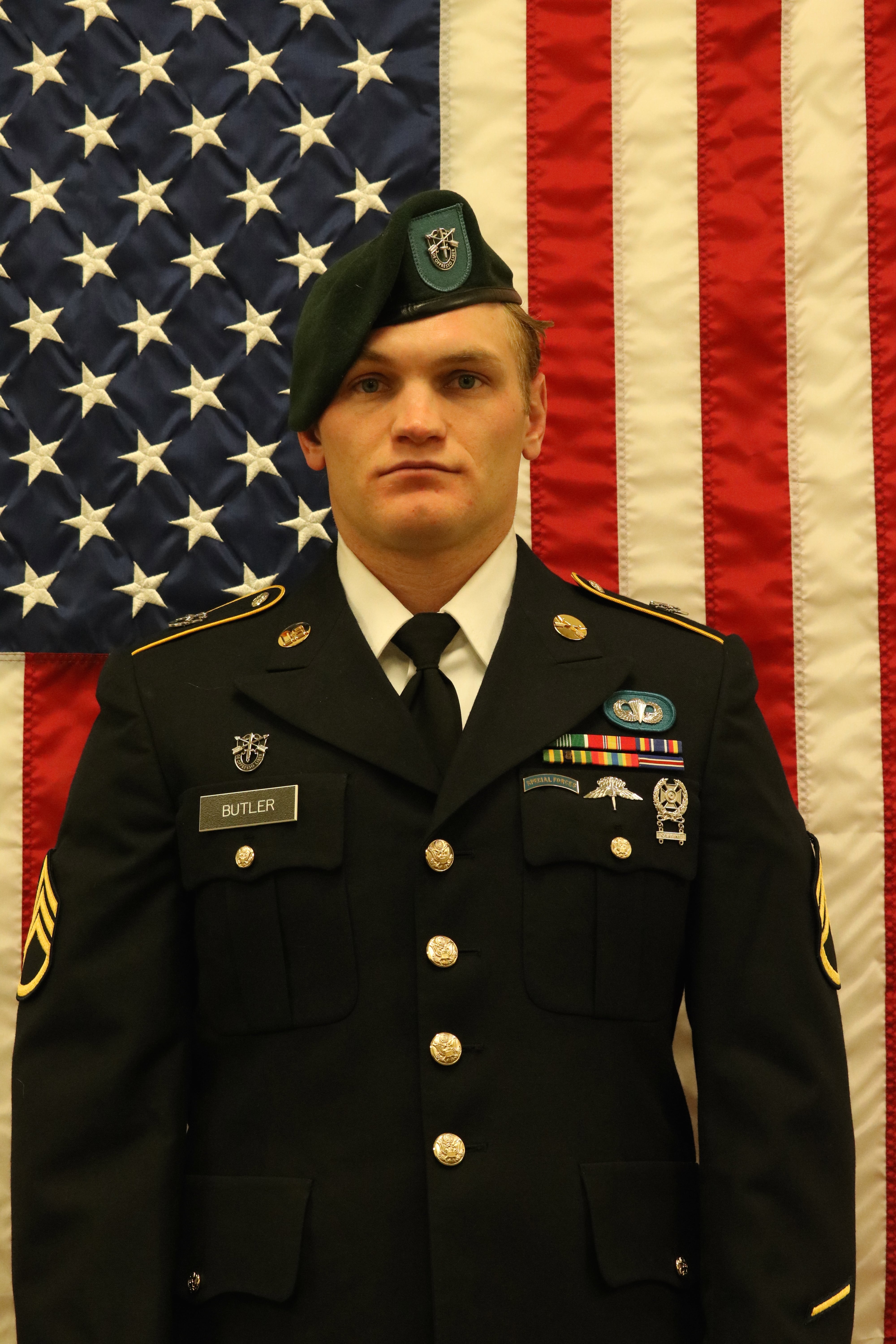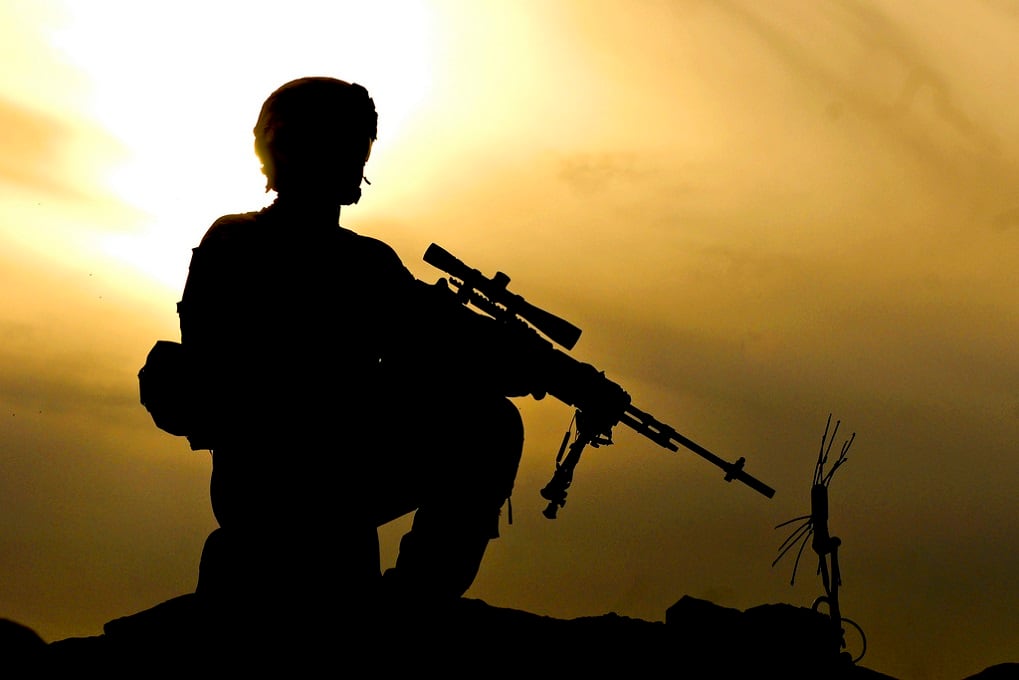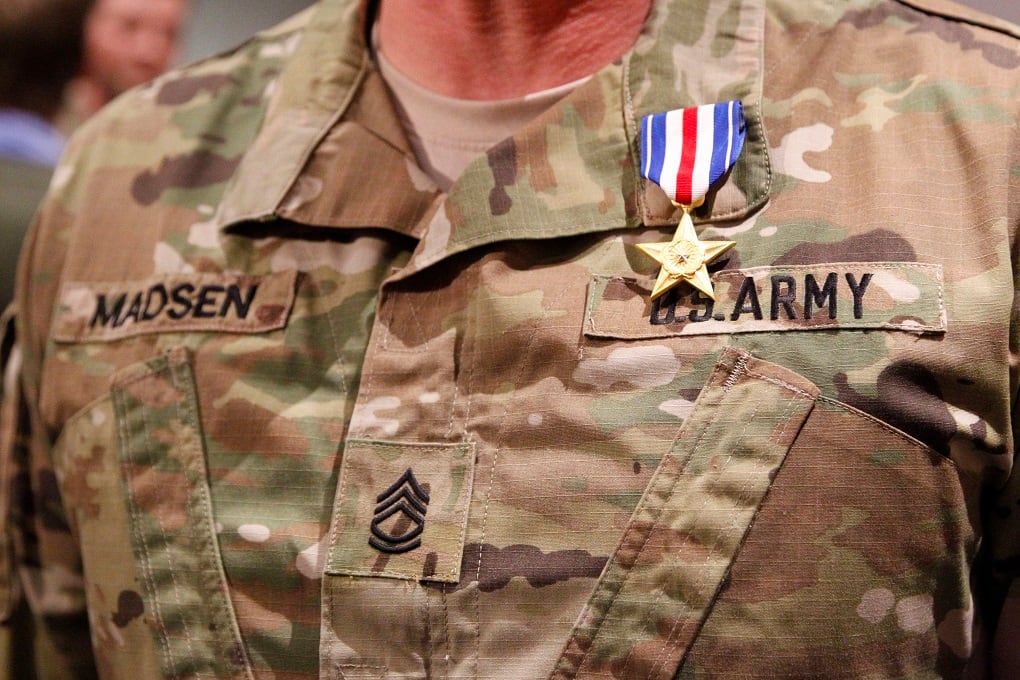Nineteen Special Forces soldiers with the Utah National Guard were awarded on Sunday for their acts of valor during their 2017 deployments to Afghanistan.
Several of these soldiers from Bravo Company, 1st Battalion, 19th Special Forces Group teams returned home wounded, and one — Staff Sgt. Aaron Butler — was killed in combat.
Four of the Green Berets were awarded Silver Stars during the ceremony in Draper, Utah. Five soldiers earned the Bronze Star with V device, seven soldiers received the Army Commendation Medal with V device and three were awarded the Purple Heart.
Capt. Nelson, Sgt. 1st Class Madsen, Staff Sgt. Walrath and Staff Sgt. Caldwell were awarded the Silver Star for their actions in May and August 2017. The soldiers’ first names were not announced for security reasons.
On May 21, 2017, Nelson was commanding a clearance operation in Afghanistan to drive enemy fighters out of village homes they were occupying, according to Nelson’s Silver Star narrative.
The goal was to secure a new position to disrupt enemy operations in the area.
Nelson had led his troops through the ISIS-Khorasan, an offshoot of the Islamic State group stronghold of Maktaab Bazaar when they were hit with machine gun and sniper fire, the narrative said.
RELATED

The trail vehicle’s gunner was shot in the head by a sniper, and Nelson ran to the wounded soldier amid the continued enemy fire.
He pulled the gunner from the vehicle, called for a medic, requested a medevac and directed close-air support and artillery fire missions.
The captain exposed himself to fire to encourage the Afghan forces traveling with his team to suppress the enemy and shield the soldiers’ movement. Nelson made sure his dismounted troops had gotten into the armored vehicles while remaining dismounted himself as he ran in front of the casualty evacuation vehicle, drawing fire from multiple enemy positions as he cleared a route for the convoy, the narrative said.
Nelson guided the convoy to the improvised helicopter landing zone, where he helped load the injured soldier onto the medevac.
“His independent actions that day inspired many to fight back in the face of overwhelming and unrelenting enemy fire, ensuring the safe evacuation of a critically wounded U.S. casualty,” the narrative said.

Less than 24 hours after this ambush, Nelson commanded another dismounted patrol of Special Forces soldiers and Afghan local police. Even though his team had fought to defend its new stronghold the day before, the surrounding area needed to be cleared to keep the enemy from attacking.
After leaving their covered position at the police compound, Nelson and his team came under interlocking machine gun fire, which split the element into three groups.
One group took cover behind a small wall, one group moved back to the compound for cover, and the group with Nelson was pinned down behind small rocks in an open field, the narrative said.
Nelson came out from under cover and drew the fire to himself so two of his soldiers could run back to the compound. He then ran through more enemy fire to encourage the first group to find a safer spot.
He stayed in an exposed area until everyone from his team safely made it back to the police compound.
“Captain Nelson constantly demonstrated an unbreakable devotion to his U.S. and Afghan soldiers through his inspiringly persistent disregard for his own safety and his violently tenacious protection of his subordinates,” Utah Guard spokesman Lt. Col. Steven Fairbourn said during the ceremony.
Three months later
On Aug. 16, 2017, U.S. soldiers with the Special Operations Task Force-Afghanistan conducted a dismounted mission alongside the Afghan National Army’s 8th Special Operations Kandak Commandos.
The goal was to clear the area in the highly contested Mohmand Valley in Southern Nangarhar, Afghanistan, to dislodge entrenched ISIS-K fighters.
The element had taken heavy fire for eight hours, and as darkness fell, an explosive weapon detonated inside the building the team had been preparing to occupy, according to the Silver Star narratives.
The enemy fighters launched a coordinated attack, using the explosion that injured more than 30 troops to their advantage.
After the explosion, three Special Forces soldiers stood out for their actions.

‘Courageous and determined’
Despite his wounds, Sgt. 1st Class Madsen crawled into an armored vehicle and pulled his way to the turret while directing the U.S. soldiers around him to return fire on the enemy.
Madsen took control of the vehicle’s MK19 automatic grenade launcher and began delivering “punishing suppressive fire upon the emboldened ISIS-K fighters,” his Silver Star narrative said.
Once he was out of ammunition, he switched to a light machine gun, firing on the enemy until he used up that ammo, too.
But he wasn’t done. He then unleashed an MK14 grenade launcher on the enemy as his fellow soldiers matched his volume of fire, the narrative said.
“Sergeant First Class Madsen’s courageous and determined example inspired the limited number of troops who were not already wounded or rendering aid, to violently strike back at their attackers, ultimately suppressing the threat long enough for the medical evacuation helicopters to load the most critical patients,” according to his narrative.
‘Disregarded his own suffering’
Staff Sgt. Walrath was one of the soldiers injured from the explosion, with hundreds of fragments of shrapnel and concrete lodged in his body. But that didn’t stop him from ignoring his own injuries and turning his attention to his teammates.
“Though Staff Sergeant Walrath was bleeding freely from his own wounds, he completely disregarded his own suffering to immerse himself in the care of his wounded comrade,” his Silver Star narrative said.
He assessed and aided the injured soldiers closest to him, then moved throughout the blast area to help move and treat a mortally wounded soldier.
Walrath did this while exposing himself to enemy fire, the narrative said. At one point, he used his own body to shield one of the wounded soldiers from an incoming rocket-propelled grenade.
In the middle of the chaos, Walrath calmly communicated with the caregivers under his direction so they could provide aid to the wounded. He ensured that as many wounded troops as possible were placed on the overcrowded medevac helicopters, declining to evacuate himself before anyone else.
“On his own accord, he ignored all sense of self-preservation and continued to maneuver dismounted with his element, exchanging fire with the enemy until he was no longer able to walk under his own power,” the narrative said.
‘Judgment matched with devoted care’
Staff Sgt. Caldwell also began to collect and assess the wounded after the explosion went off. He began directing the organization and management of the patients, stopping only to deliver critical life-saving interventions, the narrative said.
Caldwell performed at least four surgical procedures in the field, according to his Silver Star narrative.
He raced from patient to patient while under heavy enemy fire and made sure no troops or weapons had been left behind in the building. Caldwell then communicated critical information to the ground force commander related to the medevac, all while intermittently exchanging fire with the enemy.
“While inescapably exposed at the staging area, he displayed exemplary clinical judgment matched with devoted care as he prioritized patients for MEDEVAC and helped coordinate the load-out of the arriving aircraft himself,” his narrative said.
For their bravery, these four soldiers received the Silver Star during Sunday’s ceremony.
The Colorado National Guard has also approved a Silver Star for a soldier from Bravo Company, 5th Battalion, 19th Special Forces Group (Airborne). This is along with seven Purple Hearts, 10 Bronze Stars with V device and eight Army Commendation Medals with V device.
Details of the Colorado soldiers awarded and the actions involved were not yet available.
These soldiers were deployed to the same missions as the Utah soldiers, but two separate ceremonies were held to minimize the travel impact on service members.
Charlsy is a Reporter and Engagement Manager for Military Times. Email her at cpanzino@militarytimes.com.




